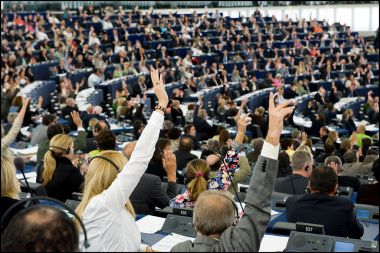The European Parliament has called for improvements to be made to three eastern Europe decommissioning programs if generous European Union (EU) funding is to be renewed.
 |
| The European Parliament consists of 736 members directly elected every five years |
This includes financing for the decommissioning of nuclear reactors at Ignalina in Lithuania, where €1.3 billion ($1.8 billion) of Brussels money is expected to be spent from 2007-13; Bohunice in Slovakia, where €613 million ($895 million) is being spent in this period; and Kozloduy in Bulgaira, where €868 million ($1.26 billion) is being spent, said MEPs.
And these politicians are not happy about how these funds have been allocated. A parliamentary resolution has criticised delays in work; a lack of coordination in projects; and too much money going to unrelated energy schemes. A motion said 55.62% of the Ignalina funds, 59.3% of the Bohunice money, and 41.8% of the Kozloduy funding had been disbursed.
This spending had occurred, said MEPs, despite what they say are major flaws in the reactor closure plans. The motion noted "with concern that the detailed decommissioning plans of the three decommissioning programs in question have not yet been finalised and, as a consequence, that there is insufficient information on the timetables, the costs of particular projects, and their sources of funding..."
If this spending was to continue after 2013, "these programs must be improved if the EU is to continue its support," said a parliament communiqué. The motion called on the European Commission to establish a coordination team to supervise the plans, their timetabling and the use of money so far. The resolution, drafted by Romanian conservative MEP Marian-Jean Marinescu noted a special report on the three decommissioning programs was being drafted by EU financial watchdog the Court of Auditors, which will be published in the third quarter of this year. MEPs want the auditors to look for public procurement and fraud-linked irregularities in the schemes.
By Keith Nuthall
for World Nuclear News




_28178.jpg)
_66891.jpg)
_30199.jpg)
_72306.jpg)





